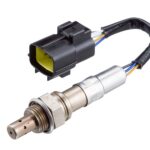
Nissan Xterra Engine Oil Capacity & Maintenance Guide

We provide a complete and precise reference for Nissan Xterra engine oil capacities, recommended viscosities, service intervals, and step-by-step maintenance. This detailed guide is built for owners, technicians, and enthusiasts seeking accurate, professional-grade data.
1. Why Correct Oil Capacity Matters
Maintaining the correct oil level is critical to engine health. Too little oil leads to lubrication failure and metal-to-metal contact, while overfilling can create foaming, high crankcase pressure, and leaks. The following specifications ensure your Xterra operates at peak efficiency.
2. Nissan Xterra Engine Variants and Oil Specifications
The Nissan Xterra has gone through two generations, each with distinct engines. The table below summarizes the oil capacity, viscosity, and engine details for every major configuration.
| Generation / Years | Engine / Code | Displacement | Oil Capacity (with filter) | Recommended Viscosity | Notes |
|---|---|---|---|---|---|
| 2000–2004 (Gen 1) | KA24DE (I-4) | 2.4 L | 4.1 qt (≈ 3.9 L) | 5W-30 | Standard for base models |
| 2000–2004 (Gen 1) | VG33E (V6) | 3.3 L | 3.5 qt (≈ 3.3 L) | 5W-30 | Used in SE and SC trims |
| 2005–2015 (Gen 2) | VQ40DE (V6) | 4.0 L | 5.4 qt (≈ 5.1 L) | 5W-30 | Used across all later models |
Technical Notes
- Some manufacturer data shows two oil fill levels: “service fill” and “dry fill.” The service fill (used during oil changes) is the lower figure shown above.
- The 4.0 L V6 typically takes around 5.4 quarts with the filter, while the 3.3 L V6 uses about 3.5 quarts.
- Always confirm your exact engine code and trim level before refilling.
3. Recommended Oil Type & Viscosity
All Nissan Xterra engines are optimized for SAE 5W-30 motor oil. This viscosity provides ideal cold-start protection while maintaining sufficient film strength at operating temperature.
You may be interested in reading Nissan Xterra Oxygen Sensor: Complete Guide to Location, Symptoms, and Replacement
Nissan Xterra Oxygen Sensor: Complete Guide to Location, Symptoms, and ReplacementIn warmer climates or for high-mileage engines, 10W-30 or 10W-40 may be used if temperatures rarely drop below freezing. Always choose oil that meets or exceeds API SP or the latest manufacturer standards.
4. Oil Change Intervals
Routine oil changes are essential for maintaining the engine’s reliability and longevity.
- Normal conditions: every 5,000 miles (8,000 km) or 6 months
- Severe conditions: every 4,000 miles (6,400 km) or 4 months
- Inspect oil color, odor, and level monthly or before long trips.
5. Step-by-Step Oil Change Guide
The procedure below applies primarily to the 4.0 L V6 (VQ40DE) but works similarly for other Xterra engines.
Detailed Procedure
- Warm the engine for 2–3 minutes to help oil flow freely.
- Lift the vehicle and place it on secure jack stands.
- Remove the drain plug and let oil drain completely into a pan.
- Remove the oil filter using an appropriate wrench; clean the mounting surface.
- Lubricate the new filter gasket with clean oil, then install by hand until snug plus a quarter turn.
- Reinstall the drain plug with a new crush washer to prevent leaks.
- Add fresh oil through the filler neck using a funnel. Pour gradually and check frequently.
- Run the engine for 30 seconds, turn it off, wait 2–3 minutes, and verify the oil level.
- Dispose of used oil at a recycling facility or authorized service station.
For best performance, replace the engine air filter during every oil service interval.
6. Oil Capacities by Model Year
First Generation (2000–2004)
- 2.4 L I-4 (KA24DE) — 4.1 quarts
- 3.3 L V6 (VG33E/VG33ER) — 3.5 quarts
Second Generation (2005–2015)
- 4.0 L V6 (VQ40DE) — 5.4 quarts
Always measure the final level with the dipstick rather than relying solely on volume.
You may be interested in reading Nissan Xterra Oxygen Sensor: Complete Guide to Location, Symptoms, and Replacement
Nissan Xterra Oxygen Sensor: Complete Guide to Location, Symptoms, and Replacement Nissan Xterra Oil Change Guide (2005–2015): Complete Step-by-Step Procedure for the VQ40DE Engine
Nissan Xterra Oil Change Guide (2005–2015): Complete Step-by-Step Procedure for the VQ40DE EngineOverfilling
Adding too much oil can cause foaming, crankcase pressure buildup, and leaks. Always stop at the “FULL” mark on the dipstick.
Underfilling
Running with low oil levels reduces lubrication, increasing wear on bearings and camshafts.
Oil Consumption or Leaks
If the oil level drops between changes, check:
- Drain plug and oil pan gasket
- Oil filter seal
- Valve cover and timing cover gaskets
- PCV valve and hoses
Wrong Viscosity
Using oil that is too thin for your climate can lead to poor pressure and noisy valvetrain operation. In high-temperature or high-mileage conditions, a slightly thicker grade may be safer.
8. Expert Recommendations
- Always confirm the engine code (KA24DE, VG33E, or VQ40DE) before adding oil.
- Use 5W-30 synthetic or semi-synthetic oil for most climates.
- Replace the oil filter and drain plug washer at every service.
- Keep maintenance records with mileage, oil brand, and viscosity.
- Warm the engine briefly before draining to remove contaminants efficiently.
9. Summary
| Engine | Years Used | Capacity (w/ filter) | Recommended Oil |
|---|---|---|---|
| KA24DE 2.4 L I-4 | 2000–2004 | 4.1 qt (3.9 L) | 5W-30 |
| VG33E 3.3 L V6 | 2000–2004 | 3.5 qt (3.3 L) | 5W-30 |
| VQ40DE 4.0 L V6 | 2005–2015 | 5.4 qt (5.1 L) | 5W-30 |
By following these detailed specifications and maintenance practices, your Nissan Xterra will continue delivering its rugged reliability, smooth power delivery, and off-road durability for years to come.
You may be interested in reading Nissan Xterra Oxygen Sensor: Complete Guide to Location, Symptoms, and Replacement
Nissan Xterra Oxygen Sensor: Complete Guide to Location, Symptoms, and Replacement Nissan Xterra Oil Change Guide (2005–2015): Complete Step-by-Step Procedure for the VQ40DE Engine
Nissan Xterra Oil Change Guide (2005–2015): Complete Step-by-Step Procedure for the VQ40DE Engine How to Replace the Crankshaft Position Sensor on a Nissan Xterra
How to Replace the Crankshaft Position Sensor on a Nissan XterraIf you want to know other articles similar to Nissan Xterra Engine Oil Capacity & Maintenance Guide you can visit the category Service and Parts.
Leave a Reply





More content of your interest